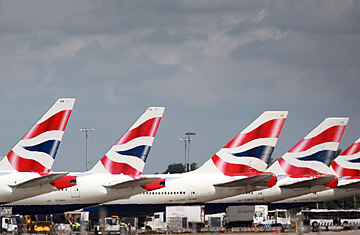
British Airways aircraft line up at Heathrow Airport
British Airways posted a deficit for its most recent fiscal year. The company lost $595 million. Part of that was because fuel costs rose 45% to more than $4 billion.
Fuel costs may have been a culprit, but the major problem the airline faces is that it sees no signs of improvement in the economy. BA's CEO said, "The prolonged nature of the global downturn makes this the harshest trading environment we have ever faced and, with no immediate improvement visible, market conditions remain challenging." (See pictures of Heathrow's Terminal 5.)
There are no "green sprouts" at 35,000 feet.
Since BA does business in almost every major country in the world, it is not a bad barometer of both consumer and business spending, at least the discretionary parts. If people cannot afford to fly they are unlikely to be aggressive consumers. If enterprises will not put their employees on airplanes, the recession is still likely to still be hurting corporate margins.
BA's results are a microcosm of the trouble that may face the economy over the next several quarters. Oil now trades above $60 a barrel. Fuel prices will inevitably move up making the cost of living and doing business higher while the abilities of consumers and businesses to spend are already in retreat. (Read: "British Airways: Cabin Pressure.")
It is one thing to suffer through a recession when commodities prices are fairly low. It is another circumstance entirely when there is inflation of the core prices of essentials such as oil and gas.
— Douglas A. McIntyre
Read: "In the Downturn, Europe's Airlines Scramble to Merge."
For constant business updates, go to 24/7wallst.com.
